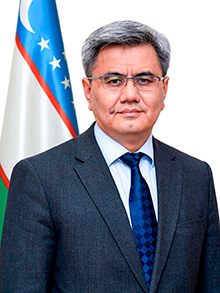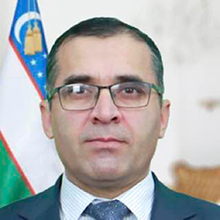Publications
Azerbaijan is not de-coupling from the West  By Vasif HUSEYNOV, PhD, Head of Department, AIR Center, Adjunct Lecturer, ADA and Khazar Universities, Baku By Vasif HUSEYNOV, PhD, Head of Department, AIR Center, Adjunct Lecturer, ADA and Khazar Universities, Baku
Over the past two years, since the beginning of the Russia-Ukraine conflict, Azerbaijan’s foreign and security policies have drawn varying interpretations from experts and political observers. The delicate balancing act pursued by Baku between competing global powers while safeguarding the country’s national interests and restoring its territorial integrity has appeared as an intriguing case for the studies of international relations. Amidst the evolving dynamics of regional geopolitics, Azerbaijan’s recent engagements with Western counterparts underscore its unwavering commitment to maintaining robust relations with the West. Despite the complexities of navigating relations with neighbouring powers, Azerbaijan remains steadfast in its pursuit of multilateral or, as better known in the Azerbaijani discourse, balanced approach in foreign policy.
Many experts are still debating how the Azerbaijani government succeeded to dismantle the separatist regime in Karabakh without provoking a clash with Russia, widely known to be the major protector of this regime. In November 2023, during an international conference in a European city attended by the author of this article, Armenian experts critiqued the collaboration between Azerbaijan and the Western powers (i.e., the EU and United States) in September 2023 to dismantle to the separatist regime, aiming to diminish Russia's influence in the South Caucasus. Interestingly, some of these experts now suggest that Baku has aligned with Moscow to penalize Armenia’s pro-Western government. This situation underscores the complexity of Azerbaijan's foreign policy, often susceptible to misinterpretation.
READ MORE
Publications
False expectations  By Benyamin POGHOSYAN, PhD, Chairman, Center for Political and Economic Strategic Studies By Benyamin POGHOSYAN, PhD, Chairman, Center for Political and Economic Strategic Studies
Ever since the end of the 2020 Nagorno-Karabakh war, every meeting between Armenian and Azerbaijani leaders has been portrayed as raising significant expectations of some breakthrough. In 2021, all looked to Russia, where Prime Minister Pashinyan and President Aliyev met twice in January and November. Starting from 2022, the geography of hope for a breakthrough moved to Brussels, where Pashinyan and Aliyev met in April, May, and August. Even the large-scale Azerbaijani incursion into Armenia in September 2022, less than two weeks after the August 31 trilateral summit in Brussels, did not appear to diminish the hopes that every meeting may bring Armenia and Azerbaijan closer to peace. In late September 2022, experts and policy officials started to speak about possibly signing a peace deal by the end of 2022. Even the absence of a peace agreement and the start of the blockade of Nagorno-Karabakh by Azerbaijan in December 2022 did not shake the belief in some magic after each Armenia – Azerbaijan negotiation encounter. In the first half of 2023, the center of gravity of expectations shifted towards Washington DC as Armenian and Azerbaijani foreign ministers held two rounds of negotiations in May and June. Even the disregard by Azerbaijan towards the measures of International Court of Justice on the blockade, the establishment of block post on the Lachin corridor in April, and the complete cut of Nagorno–Karabakh from the world in June 2023 somehow did not significantly decrease the hopes that Armenia–Azerbaijan negotiations would bring results soon.
READ MORE
Publications
The Groundwork of Economic Reforms in 2024. On the situation in the economy and the tasks set  Obid Khakimov, director of the Center for Economic Research and Reforms under the Administration of the Republic of Uzbekistan
Obid Khakimov, director of the Center for Economic Research and Reforms under the Administration of the Republic of Uzbekistan
The dynamic growth of the population of Uzbekistan requires at least high outstripping economic growth rates in order to adequately meet the growing needs and improve the standard of living of people. But this requires new, more balanced and verified approaches to ensure timely achievement of the set goals.
And these new approaches to economic policy were clearly manifested in the decisions taken at the important meetings held at the beginning of the year under the chairmanship of the President of Uzbekistan Shavkat Mirziyoyev on the situation in the economy and the tasks assigned to the economic divisions for 2024.
READ MORE
Publications
Uzbekistan is creating its own model for combating corruption  Qodir Djuraev, MP, Legislative Chamber of Oliy Majlis (national parliament) of the Republic of Uzbekistan
Qodir Djuraev, MP, Legislative Chamber of Oliy Majlis (national parliament) of the Republic of Uzbekistan
One of the most crucial issues in the rapidly changing world is undoubtedly corruption. The human history suggests that this phenomenon brought even the most powerful nations to the brink of collapse.
Corruption is a perilous misfortune with negative impact on the entire human race, on foundation of any state and society, economic development; it undermines rule of law and sharply weakens public confidence in government, hinders advancement of democratic institutions.
Unfortunately, this problem has not been alien Uzbekistan. Until very recently, the latter had been known as one of those countries with highest perceptions of corruption.
READ MORE
Publications
What Does Azerbaijan Want?  By Benyamin POGHOSYAN, PhD, Chairman, Center for Political and Economic Strategic Studies By Benyamin POGHOSYAN, PhD, Chairman, Center for Political and Economic Strategic Studies
After the military takeover of Nagorno Karabakh by Azerbaijan in September 2023 and the forced displacement of Armenians, there were some hopes in Armenia and abroad that an Armenia – Azerbaijan peace agreement was within reach. These hopes were based on the assumption that Azerbaijan received everything it could dream of just a few years ago.
After September 2023, Azerbaijan controlled the entire Nagorno-Karabakh, with only a handful of Armenians remaining there. The Armenian government accepted that reality with no intention to challenge it, while the international community did nothing tangible to punish Azerbaijan or create conditions to bring Armenians back. President Ilham Aliyev proved to everyone that he was not a “golden boy” who became president just because he was the son of a prominent leader – Heydar Aliyev – and lacked basic governance skills. He succeeded where his father failed, taking control over Nagorno Karabakh and raising Azerbaijani flags in Shushi and Stepanakert.
READ MORE
Publications
Will an Armenia-Azerbaijan peace agreement be indefinitely delayed?  By Vasif HUSEYNOV, PhD, Head of Department, AIR Center, Adjunct Lecturer, ADA and Khazar Universities, Baku By Vasif HUSEYNOV, PhD, Head of Department, AIR Center, Adjunct Lecturer, ADA and Khazar Universities, Baku
2023 ended with positive notes for the Armenia-Azerbaijan peace process, but the new year has so far failed to maintain the momentum. Despite a successful prisoner exchange, and Armenia’s endorsement of Azerbaijan’s COP29 candidacy, recent statements from the respective governments have presented a mixed picture. While the Azerbaijani side has not indicated any setbacks in the ongoing talks yet, the Armenian government has criticized the recent statements by the Azerbaijani leader as unconstructive for the peace process.
Complicating matters further, disagreements have intensified regarding the possible regulations along the Zangezur corridor. The latest developments highlight a disparity in the visions of Russia, Armenia, and Azerbaijan for this corridor. Unfortunately, these developments suggest that the obstacles in the Armenia-Azerbaijan peace treaty talks may be more fundamental, potentially leading to indefinite delays in the process.
READ MORE
Publications
Is Aliyev sincere in his peace plans?  By Yeghia TASHJIAN, Beirut-based regional analyst and researcher, columnist, "The Armenian Weekly” By Yeghia TASHJIAN, Beirut-based regional analyst and researcher, columnist, "The Armenian Weekly”
On January 10, 2024, Azerbaijan’s President Ilham Aliyev gave a 2.5-hour interview with local TV channels. In his interview, Aliyev not only repeated false remarks and justified the ethnic cleansing of the Armenians of Artsakh but also threatened Armenia. When it comes to delimiting and demarcating the Armenia-Azerbaijan border, he rejected the old Soviet maps proposed by Armenia, arguing, “In the 20th century, the lands of Azerbaijan were given to Armenia in parts. One day after the establishment of the Azerbaijan People’s Republic in 1918, the ancient Azerbaijani city of Erevan was handed over to Armenia. After the Sovietization in April 1920, in November, the Soviet government took the bigger part of Western Zangezur from Azerbaijan and handed it over to Armenia. By May 1969, Azerbaijani lands were given to Armenia in parts, and from an area of about 100,000 square kilometres, it dropped to 86,600 square kilometres.”
READ MORE
Publications
Assessment of poverty indicators in the Republic of Uzbekistan by the end of 2023  The CERR jointly with the Statistics Agency, assessed the level of monetary poverty in Uzbekistan. By the end of 2023, poverty in the country decreased by 3.1 percentage points. The experts explained how the poverty profile has changed and in which regions the incomes of the population have shown the greatest growth.
The CERR jointly with the Statistics Agency, assessed the level of monetary poverty in Uzbekistan. By the end of 2023, poverty in the country decreased by 3.1 percentage points. The experts explained how the poverty profile has changed and in which regions the incomes of the population have shown the greatest growth.
According to the results of the assessment of the Statistics Agency under the President of Uzbekistan, by the end of 2023, the poverty level in Uzbekistan has decreased to 11.0%.
READ MORE
|
|